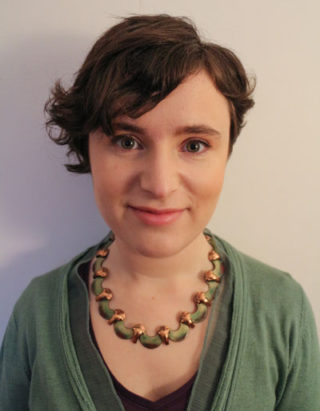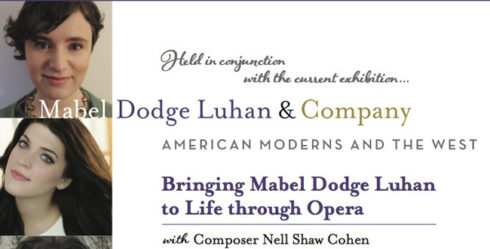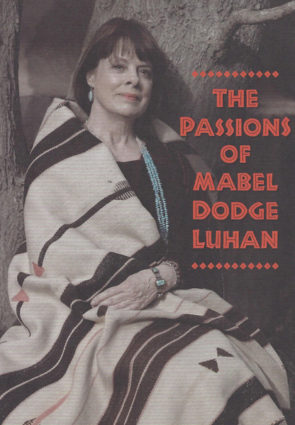by Elizabeth Cunningham

Brooklyn-based composer and librettist Nell Shaw Cohen, Composers & the Voice Fellow, American Opera Projects
It’s amazing how Mabel continues to inspire. The subject of a recent play performed earlier this summer in Taos (see below), her life is clearly suited to dramatic expression. So thought composer and librettist Nell Shaw Cohen. On August 12th the Harwood Museum of Art presents “Bringing Mabel Dodge Luhan to Life through Opera,” showcasing excerpts from Nell’s opera-in-progress. This new chamber opera follows Mabel’s journey as she reinvents herself during her early Taos years.
A recent press release gives further insight to this performance:
A talk by the composer will accompany this workshop reading of excerpts from the opera-in-progress—tentatively titled “Mabel’s Call”—given by performers whose credits include The Santa Fe Opera and major national and international venues. Soprano Shelley Jackson will sing the role of Mabel Dodge Luhan with tenor André García-Nuthmann as Maurice Sterne and baritone Carlos Archuleta as Tony Lujan, accompanied by music director Kristin Ditlow on piano.
The four scenes and three arias on this program explore Mabel Dodge Luhan’s relationships with Maurice Sterne and Tony Lujan, the tensions between appreciation and appropriation in her interactions with Taos’s indigenous communities, and her efforts to create a new personal and national identity through place—culminating in her mission to bring artists and intellectuals to Taos. Cohen will introduce each excerpt, illuminating challenges and inspirations she has encountered in writing this operatic retelling of Luhan’s life.

Performers for “Mabel’s Call” (working title) under the direction of Nell Shaw Cohen. Left to right: Soprano Shelley Jackson as Mabel; tenor André García-Nuthmann as Mabel’s 3rd husband Maurice Sterne; baritone Carlos Archuleta as Mabel’s 4th and final husband Tony Lujan; music director Kristin Ditlow, accompanist
Recently I interviewed Nell. We met over tea and cookies at the Mabel Dodge Luhan House. I learned that she writes music for chamber ensembles, orchestra, and voice. Asked how she came to Mabel, the route was fascinating. Earlier Nell had created lyrically expressive and visually evocative works around several artists, including Charles Burchfield and Georgia O’Keeffe. I likened her approach to ekphrasis — “a literary description of or commentary on a visual work of art” — only Nell added music to the equation. Four Burchfield paintings informed her wind quartet, “Watercolors.” She later enlarged her scope with a monodrama “The Coming of Spring” based on Burchfield’s writings and paintings.
Nell composed the score for the orchestral tone poem “From the Faraway Nearby” based on the paintings of Georgia O’Keeffe in 2009. A year later, Nell traveled to the Abiquiu area to film O’Keeffe country. Also a talented multi-media artist, she edited and animated the footage. She titled the resulting video The Faraway Nearby: Georgia O’Keeffe and the New Mexico Landscape. On that trip to New Mexico, Nell learned about Mabel. She and her film-crew parents stayed at the Mabel Dodge Luhan House. The experience stayed with Nell. She began researching Mabel. Even after all of the changes that had taken place since Mabel’s arrival in 1918, Nell still felt her legacy. Visitors like O’Keeffe and Ansel Adams had interpreted the physical and spiritual landscapes of northern New Mexico. Noting numerous visual and literary artistic depictions of these environs, Nell realized there was room for more interpretations through contemporary classical music. As a composer whose work is often fueled by visual art and experiences of the natural world, she seized the opportunity. Her ideas became music, evolving into a one-act opera interpreting Mabel.
In 2016 Nell returned to Taos on a three-month artist residency. Like artists in Mabel’s time, she found the space and silence to create. Nell expressed her delight at the opportunity to premiere an excerpt from “Mabel’s Call” in Taos. “It’s a dream come true: to create a piece about a place, while in the place, to be performed in that place.”

Opera is an art form suited to big ideas, big personalities, and big emotions. Taos’ Mabel Dodge Luhan was a larger-than-life character born for the operatic stage.
Ending our interview, I asked Nell for a quote from the libretto. She gave me the line that Mabel and Tony sing when they call to the world’s artists and intellectuals in the opera’s finale:
Hear the song of peace
Know the bliss of Being
Feel the beating heart
Then teach the world
A better way of life
DETAILS:
Presented by the Harwood Museum of Art in conjunction with the exhibit Mabel Dodge Luhan & Company: American Moderns and the West, “Bringing Mabel Dodge Luhan to Life through Opera.” Friday, August 12, 2016, 5:30-7:00pm in the Harwood Museum of Art’s Arthur Bell Auditorium. Tickets are $20 General/$16 Member and are available at the Harwood Museum, 575-758-9826.
* * * * *
Leslie Harrell Dillon performed her play, The Passions of Mabel Dodge Luhan this past June (the Harwood Museum of Art) and July (Mabel Dodge Luhan House classroom). Both nights sold out. If you didn’t get a chance to see the play in Taos, there’s an opportunity to see it in Santa Fe. The show opens on August 11th at the new Teatro Paraguas (3205 Calle Marie) and runs through August 21st. Performances: Thursday, Friday, Saturday at 7:30pm, Sunday at 2:00pm.

Overview: Mabel conducts one of her famous “Evenings” with the audience – a wild and funny exploration of a passionate past, and a call to arms for an invigorated future. Playwright and actor Leslie Harrell Dillen researched Mabel’s papers at Yale’s Beinecke Library. The script uses all of Mabel’s words to present a poignant, sometimes humorous, 75-minute synopsis of her life.
Reviews: Lois Rudnick, biographer and author of Mabel Dodge Luhan: New Woman, New Worlds, noted: “Leslie’s Mabel is alive, true, and riveting.” Other reviewer comments: “Dillen totally embodies the essence of Mabel…Such a complex and varied and rich character.” “A stellar performance and a wonderful piece of writing.”
Leslie Harrell Dillen has appeared in theater, television and film, in New York, San Francisco and Boston. As a playwright she has written six solo shows and several full-length plays. She performed these throughout the U.S. including San Francisco’s American Conservatory Theater and New York’s Off Center Theater as well as at the New York Fringe Festival and in Scotland at the Edinburgh Fringe Festival. Most recently, Leslie is the voice of Mabel for the award-winning documentary film, Awakening in Taos.